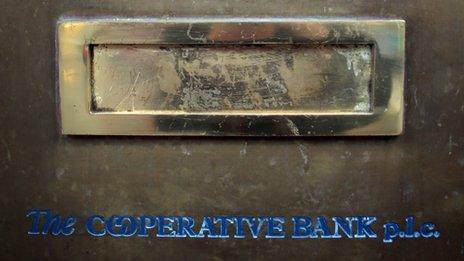Why co-ops have to be better than the rest
- Published
- comments

The debacle at Co-op Group and Co-op Bank highlights a fundamental problem for all mutuals or organisations owned and managed on co-operative lines by members.
Which is that in order to thrive, they don't just have to be as efficient and successful as conventional companies that have outside shareholders, they have to be, in a broad sense, better than the mainstream (I will come back to what I mean by that).
The structural weakness of mutuals is that they typically don't have access to outside equity capital.
Why does that matter?
Well, if for example losses blow a hole in the balance sheet of a mutual bank or insurer, that's an existential crisis - because they have no mainstream institutions as big shareholders that can be tapped to fill that hole.
In the case of Co-op Bank, there was and is Co-op Group as the sole owner. But it did not have the resources to supply the £1.5bn of capital needed by Co-op Bank to continue trading.
So the rescue of Co-op Bank has been complicated and tortuous - and involves its creditors converting £1.3bn of bonds and preference shares into equity capital and providing a bit more investment on top of that.
Now there is a good chance that this rescue will succeed. We'll have a clear idea when the first round of creditors' votes on the deal are counted in 10 days.

The group is reviewing its system in the wake of the Rev Flowers scandal
But the Bank of England remains on high alert, just in case it all falls apart - and it would have to step in with an imposed rescue plan or "resolution" scheme that would protect depositors and the bank's important functions.
Or to put it another way, saving Co-op Bank has been more messy and complicated precisely because it is owned by a mutual.
That explains why it is so important that the biggest mutual bank, Nationwide, isn't seen as just another bank.
It has to be extremely good at what it does and generate sufficient profits to augment its capital as a buffer against potential future losses. And arguably it is carrying this off well, as I pointed out on Friday.
The simple, obvious point is that being a mutual ain't easy.
This applies in a slightly different way to non-financial businesses, too, such as the Co-op Group's supermarkets, pharmacies and funeral homes.
Because (again) they are unable to tap outside investors for funds, it would be very serious for them if they were to generate losses more than very occasionally - because without profits, they could not invest in maintaining or improving the quality of the business.
And in competitive markets, they would wither, shrink and eventually expire (though the end would be more of a whimper than the bang of bank failure).
That said, in good times, mutuals have two significant advantages over businesses owned by entrepreneurs and investors.
They are perceived, in an important though slightly nebulous way, to be more ethical than conventional companies, or at least to be focused more explicitly on serving the interests of customers who are also - as members - the owners.
And when things are going well, they should have more money than the non-mutual opposition to invest in improving services or cutting prices, because they don't have to pay dividends to investment institutions or entrepreneurial proprietors.
Which brings me in a rambling, shambling way to why the current crisis at Co-op Group is so serious.
One version of the "better" that mutuals have to be is that they have to be seen by customers to be more "decent" than other businesses - because that provides a motive for some consumers to spend their money with them.
And the second version of the better is that they have to be conspicuously competent.
It won't have escaped your notice that the appointment as Co-op Bank's chairman of a former local councillor with an apparent taste for hard drugs, a history of downloading porn on to a municipally owned computer and - by his own admission - limited knowledge of modern banking, somewhat undermines Co-op's claims to be better than the rest in both those important senses.
Which is why Co-op Group's review of its internal democratic system, that allowed the Rev Flowers to bloom quite so lustrously in the organisation, will have an important bearing on whether co-ops and mutuals will continue to be an important part of the UK's mixed economy.